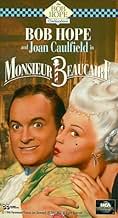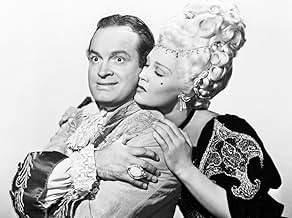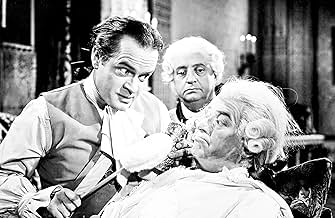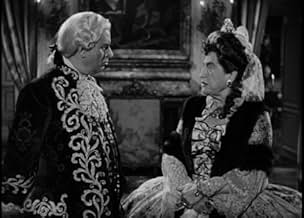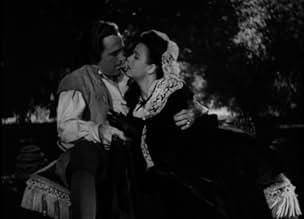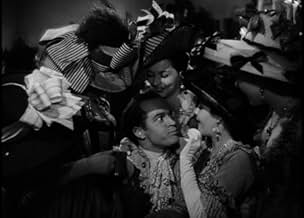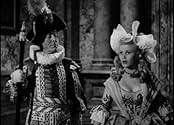A bumbling barber in the court of King Louis XV becomes engaged in political intrigue when he masquerades as a dashing nobleman engaged to the princess of Spain.A bumbling barber in the court of King Louis XV becomes engaged in political intrigue when he masquerades as a dashing nobleman engaged to the princess of Spain.A bumbling barber in the court of King Louis XV becomes engaged in political intrigue when he masquerades as a dashing nobleman engaged to the princess of Spain.
- Awards
- 1 win total
- Swordsman
- (uncredited)
- Women Who Gets Dress Ripped Off
- (uncredited)
- Court Jester
- (uncredited)
- Wife
- (uncredited)
Featured reviews
In 1946 Hope was between 44 and 42 years old, so physically he still looked reasonably presentable as a man (when properly made up with make-up) who is in his 30s. That helps considerably. Compare this film to it's Technicolor counterpart in the middle 1950s, CASANOVA'S BIG NIGHT. In that film the plot is very similar, but the middle aged man, with the middle aged spread is not believable as even a comic substitute for the great lover. He is just plausible in BEAUCAIRE. He also demonstrates his timing is sharper, and he even demonstrates (possibly accidentally, but one wonders) a gift for mimicry. At one point he is speaking when behind a mask as though he is Owen, and he momentarily does capture something of the speech pattern and bluster of the English actor.
As pure escapism the film is more than adequate. As history it is questionable. Schildkraut is a type of Spanish Napoleon, wanting to overthrow the royal family in a war between Spain and France. Hence the need for the royal marriage that involves Knowles and Reynolds. But the military in Spain in the 18th Century produced no such figure as Don Fernando (it is hard to believe the screen writers Norman Panama and Melvin Frank were thinking of a later adventurer and court favorite Count Godoy). Owen is quite good at being Louis (he had played the role a decade earlier in the George Arliss film VOLTAIRE). The year is never giver - actually it is quite vague, but 1765 seems the most probable year: At one point Collier and Owen are reminiscing about their wedding. Queen Marie (the daughter of the King of Poland) married Louis in 1725, and Owen mentions they've been married 40 years). The Queen died in 1768, and Louis died in 1774. The problem is that the Spanish King is Philip II in the cast. King Philip II of Spain ruled from 1555 - 1598. The King of Spain in 1765 was Carlos III (notable for a number of reforms, and being reluctantly drawn into policies by the French). You see, the Bourbon Family had begun ruling Spain in 1714, at the end of the War of the Spanish Succession, when King Louis XIV's second oldest son became King Philip V of Spain (the Philip they screenwriters were probably thinking of). But the so-called "Family Compact" united the foreign policies of Spain and France for most of the 18th Century. So the threat of a war between the two countries never really existed in history at this time.
There are many nice touches in the film: Hope's attempt at suicide (with an unknotted hangman's noose) that is almost pushed to completion by his friend Leonid Kinski; Hope's mimicry of Owen (mentioned above); the climactic duel between Hope and Schildkraut, in which both men get entangled with a harp and a cello. Caulfield and Knowles both get a chance to sing. And Hope even (with Schildkraut's assistance) gets a passing shot (literally) at his rival/friend from the "Road" Pictures. It remains an entertaining spoof, and one of Hope's best comedies.
The Valentino version is a straight dramatic part about a Parisian barber in the court of Louis XV pretending to be a nobleman. Rudy was at his most romantic in the role and it was one of his biggest hits in the Twenties.
Bob Hope's Monsieur Beaucaire finds Bob as a barber at Versailles in the court of Louis XV and worried about the romantic intentions of his sweetheart, scullery maid Joan Caulfield. Cole Porter wrote it best that Caulfield is true to Hope in her fashion, but she's an ambitious girl who knows what it takes to get ahead in the court. She aspires to be Madame Pompadour who is played here by Hillary Brooke.
Due to a set of circumstances way too complex to write about, Hope and Caulfield both get themselves banished, mainly because of Hope's fantasies and both get themselves involved in the politics between France and Spain where a royal marriage is being arranged to the dismay of both participants, Marjorie Reynolds for the Spanish and Patric Knowles for the French.
Playing the puppet-master in all the intrigue is Joseph Schildkraut who shows a real flair for comedy. His final duel with Hope ranks right up there with one Hope engaged in with Basil Rathbone in Cassanova's Big Night.
Rounding out a wonderful cast of supporting players are Howard Freeman as the King of Spain and Reginald Owen and Constance Collier as the King and Queen of France. You don't doubt why Louis has Madame Pompadour around when you take one look at the Queen.
By the way Joseph Schildkraut comes to one of the most satisfying ends a villain ever got in film. You'll have to see Monsieur Beaucaire and laugh all the way through to see what happens.
He actually does some quite decent acting in this one. The character of the barber Beaucaire is more romantic and less cynical than the comedian Hope.
Hope has surrounded himself with some of the most talented people in Hollywood. Cinematographer Lionel Lindon was nominated three times for an Oscar and won once with "Around the World in 80 Days." Film Editor Arthur P. Schmidt was nominated twice (for "Sayonara" and "Sunset Blvd.") Composer Robert Dolan was nominated 8 times between 1942 and 1947. Sadly, he never won. He should have been nominated for this movie, but he was already nominated for "Blue Skys" in 1946. Art Director, Hans Dreier, was nominated 20 times and won 4 Oscars. He should have been nominated for this movie, but he already had two other nominations in 1946. Set Decorator, Sam Comer was nominated 22 times and also won 4 Oscars. Male Costume Designer Giles Steele got 4 nominations and won twice. Mary Kay Dobson. who did the exquisite gowns in this film, was never nominated, but she should have won an Oscar for the fantastic four foot wide hooped skirts the women wear.
Hope was never nominated for an Oscar, but this is the one movie where I think his performance merited consideration.
Joan Caulfield, in only her second film, is dazzling. As Mimi, Beaucaire's love interest, she is hilarious and has excellent chemistry with Hope. The same year, she played the love interest of both Fred Astaire and Bing Crosby in "Blue Skys". Everybody else in the cast is just delightful.
The funniest scene is when Beaucaire meets the King of Spain. Beaucaire is pretending to be an aristocrat. He is told to act "distainful" When they meet, Beaucaire and the King just glare at each other through lorngettes (opera glasses).
Second funniest is when Beaucaire gets exposed as a barber and slapped. The king tells him to slap the fellow back. "Everybody is entitled to his opinion," answers Hope meekly, "Why if I had a sword..." A lackey offers his sword to Hope, who quickly pushes him away, saying, "Mind your own business." If you're in the mood for a wonderful and sweet old romantic comedy, put across by some of the most talented people in the golden age of Hollywood, don't miss it.
Hope is Beaucaire, a court barber in costume-era France. He gets mixed up in court politics and intrigue; poses as the Duc le Chandre, renowned lover and duelist; and chases after his girlfriend Mimi—who may or may not reciprocate his romantic feelings but certainly has adventures of her own.
The entire cast is lively and beautiful in this very funny picture. Joan Caulfield as Mimi is bright, charming and silly; Marjorie Reynolds as a Spanish princess is lovely. Patric Knowles is dashing enough as the notorious duke—he is the perfect choice (King Louis thinks) to be shipped off to marry said Spanish princess, not only for political reasons but because all the "young bloods" in Paris will be happy to be rid of him. Cecil Kellaway is the harried count whose difficult duty it is to transport the reluctant duke to the arranged wedding site.
Reginald Owen is hilariously un-regal as King Louis, and owns every scene he is in. Other highlights include a goofy palace swordfight between Hope and villain Joseph Schildkraut that involves a harp, a bass fiddle, and a harpsichord.
Funny and fast-paced .A couple of decent songs and the usual assortment of Hope one-liners add up to a very enjoyable picture.
Did you know
- TriviaOne of over 700 Paramount Productions, filmed between 1929 and 1949, which were sold to MCA/Universal in 1958 for television distribution, and have been owned and controlled by Universal ever since. Its initial television broadcast took place in Seattle Saturday 29 November 1958 on KIRO (Channel 7); it first aired in Boston Wednesday 4 February 1959 on WBZ (Channel 4) and in Minneapolis Sunday 8 February 1959 on WTCN (Channel 11), and as it slowly spread across the USA, it was not long before it became a popular local favorite. In Milwaukee it first aired Sunday 12 April 1959 on WITI (Channel 6), in Denver 18 May 1959 on KBTV (Channel 9), in St. Louis 23 May 1959 on KMOX (Channel 4), in Chicago 10 October 1959 on WBBM (Channel 2), in Phoenix 28 November on KVAR (Channel 12), in Philadelphia 5 December 1959 on WCAU (Channel 10), in San Francisco 27 December 1959 on KPIX (Channel 5), in Pittsburgh 14 January 1960 on KDKA (Channel 2), in Des Moines 27 January 1960 on WHO (Channel 13), in Wichita 29 January 1960 on KTVH (Channel 12), and in Toledo 15 February 1960 on WTOL (Channel 11). It was released on DVD 8 October 2002 in tandem with A vos ordres ma générale (1947) as part of Universal's Bob Hope: The Tribute Collection, and again as a single 30 October 2015 as part of the Universal Vault Series.
- GoofsReferences are made to the guillotine as a means of execution. The guillotine was not invented until the reign of King Louis XVI.
- Quotes
Mimi: Oh, you're so right. One look is enough.
Monsieur Beaucaire: That regal forehead runs in the family.
Mimi: The Hapsburg chin!
Monsieur Beaucaire: Got that from my mother.
Mimi: The Bourbon nose!
Monsieur Beaucaire: Got that from my father, drank like a fish!
Mimi: Those dark, flashing eyes - that soft lustrous hair!
Monsieur Beaucaire: You should see it after a rinse!
- ConnectionsFeatured in Bob Hope at 100 (2003)
- How long is Monsieur Beaucaire?Powered by Alexa
Details
- Runtime
- 1h 33m(93 min)
- Color
- Aspect ratio
- 1.37 : 1

